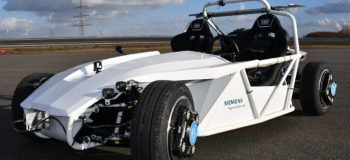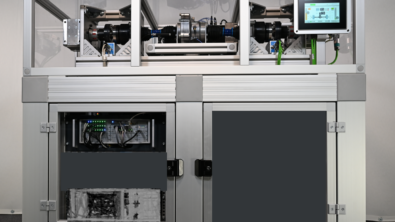SimRod experience: Why is this tonal noise so annoying in ECO mode?

ECO mode may be good… except for your ears! What’s this annoying tonal noise in our SimRod electric vehicle (EV)?
The automotive market is evolving and lots of innovations are coming on the scene, but of course, the electrification of the powertrain is the main trend in this market. Today I’d like to share the experience we had with our electric vehicle or the so-called SimRod.
So, after some free drives around Siemens, we were impressed by the power of this car and the amount of fun we can have with it. At a certain moment, we also decided to check what else was available in the car, and we found a button called ECO mode. That’s a real downer…
Indeed, in many EVs, the ECO drive option is available to save battery power. The idea is that in some drive situations, the car will regenerate power while braking. For our SimRod, it means that when in a cost-down drive, with ECO-mode ON, the power is regenerated in order to recharge the battery but something very annoying happens…a very tonal and loud sound start to occur, spoiling our drive experience! But I have to say that as NVH engineers, we saw it as the “start” of our next fun!

Using acoustic measurements to investigate EV tonal noise
Our first idea was recording some microphones in the driveline and some tacho sensors for e-motor and wheel speed while freely driving around with SimRod. That’s a very easy and fast instrumentation and in this case, we choose to use our Simcenter SCADAS XS hardware.
When checking the data, especially the order signatures, we were impressed by two orders that were dominant in some parts. We had our first clue about the problem and when it was happening (coast-down with ECO-mode ON). But we are talking about an acoustic phenomenon in place, so why not using acoustic metrics to investigate the problem?
After a quick call with our acoustic expert colleague, we decided to use our semi-anechoic room to drive with the SimRod in a more controlled environment. As the noise is dominated by a tonal (harmonic) characteristic, we directly use our Simcenter Testlab capabilities to calculate Sound Quality metrics while using the ECO-button.
See below the results showing the Prominence Ratio metric in combination with Time-Varying Loudness, and some videos recorded with our tablet camera and a GoPro:
Using Sound Quality to understand the tonal noise issue
The conclusion was that when the ECO-mode was active not only the sound was louder (Loudness metric) but also a tonal behavior was observed and we were sure that this was the main problem (Prominence Ratio map). By using the information from the vehicle, we knew that these orders were from the Input shaft (engine order 18) and from the differential (wheel order 73).
Impressive how fast and with a very simple instrumentation, we could already understand the problem but…what else? Which component in the SimRod was responsible for this tonal noise? This information was crutial if we want to suggest solutions to the SimRod manufacturer. How can we easily find the “guilty” componentbased on acoustic measurements? Sound Source Localization techniques!
Sound Camera helped us to reveal the mystery!
We quickly thought about our Simcenter Sound Camera digital array to helps us. We kept the same instrumentation on SimRod and just added the camera to the measurement chain and proceeded with measurements in the chassis-dyno.

As we knew the driving conditions to investigate, we could quickly go to the correct analysis and understand from where the sound was coming from. In Simcenter Testlab software, we used advanced techniques like Bayesian focusing to analyze the holograms by octave bands and investigate sound power values for each component.
Investigating the 73rd order…
Around the frequency range of the 73rd wheel order, we found the hologram below. The gearbox is responsible for the noise with a sound power value much bigger than the ones in other octaves! Bingo, we found the component that is generating this annoying noise while driving in ECO-mode.

…and the 18th one
We could also identify the component responsible for the 18th order but this was not a big surprise…the e-motor! This order is the first motor order and is present also when ECO mode is not in use. But we could observe that its sound power is also higher with ECO mode ON.

Do you remember our display combining the orders signatures with sound quality metrics and video replay? What about making it more complete with a sound source location movie in sync with the other displays? This is actually very easy with Testlab Neo:
Enjoy the ride
We have now all the information and some ideas on how to solve this acoustic problem to make the SimRod driving experience also pleasant while regenerating power! But now that the winter is approaching, better to keep SimRod inside and not trying to drive like my colleagues did last winter:

Now, are you interested in more information on the quick and powerful technique of Sound source localization? Here is a webinar for you. Just register and watch.


